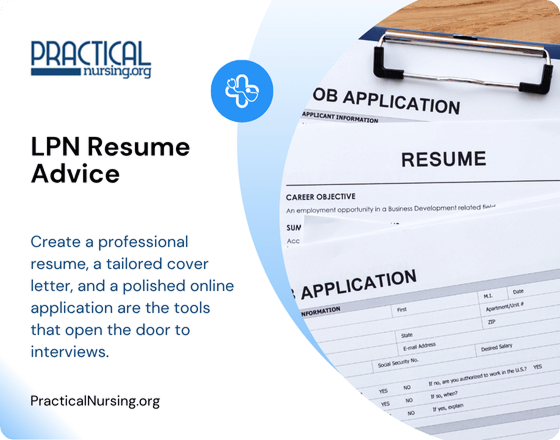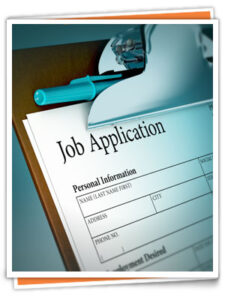LPN Resume & Job Application Advice
This guide will walk you through creating a modern, effective application that showcases your value, from building a quality resume to navigating the online application process with confidence.

Written by Jane Dewy and Edited by The PracticalNursing.org Editorial Team.

 A resume as “a brief document that summarizes your education, employment history, and experiences that are relevant to your qualifications for a particular job for which you are applying.” In other words, a resume is putting yourself on paper. Resumes are often required to be submitted with job applications. To learn how to fill out job applications.
A resume as “a brief document that summarizes your education, employment history, and experiences that are relevant to your qualifications for a particular job for which you are applying.” In other words, a resume is putting yourself on paper. Resumes are often required to be submitted with job applications. To learn how to fill out job applications.
LPN’s are professionals and therefore expected to have a professional resume. It is a good idea to include one even if the employer does not ask for one. Strive for two things when writing: perfection and persuasion. One typographical error, or “typo,” could land your resume in the trash and out of the game. Every resume needs to have a minimum of four sections, with many more optional sections. There are many templates available online. Do not be afraid to use a template as a guide. Be sure to customize your resume however. Don’t take the easy way out. For help writing your own resume continue reading as we’eve included the necessary components.
Contact Information
This is the first and easiest section of a resume to be completed. Always include accurate and up to date information in this section. At a minimum, the contact information section should include: name, telephone number, address, and email address. If you have more than one phone number, include them. If you have a personal website you can include it in this section as well. It is not a good idea to include social media accounts such as Twitter and Facebook. Employers are not interested in connecting on a “social” level. Again, always keep this section updated and correct.
LPN Objective or Summary
This section is the first piece of “real” information given to the employer. This section should lay out who you are and what you are looking for as a LPN. It should be individualized to the facility and show sincere interest. This section should be concise and not overly wordy. Several sentences are all that are required. Monster.com equates this section to “a handshake.” It is also a good idea to write a sentence outlining your future career or educational goals to show employers that you are someone who strives for self-improvement. Below is a sample objective for a new graduate LPN. Keep in mind this is only one example of an objective section. It is by no means the best or only example. The key to this section is customizing it to you as a nurse and to the facility to which you are applying. Example below:
“Newly graduated Licensed Practical Nurse seeking a challenging and responsible position in the nursing field to expand my knowledge and experience while using my current skill set and experiences to positively affect the lives of others. Working at [insert facility name here] will help me realize my career aspirations and goals by [insert reason here]. Short term career goals (within 5 years) include graduating with my Bachelors of Science in Nursing Degree and passing the NCLEX-RN examination.”
 LPN Education Credentials
LPN Education Credentials
In the education section you can give your educational history. This section is usually written in reverse chronological order; from most recent to oldest. The most important information to highlight are any degrees you may have. Always state which school you attended, city and state of the institution, graduation date, specific degree title, and any minors completed. Most sources recommend not including high school educational information, especially if it has been years since graduation.
This is a personal choice and can depend on education level and even space available. One important piece of information that is often included in the education section is grade point average or GPA. This can be a touchy subject for some. As a general rule, the higher this number the more impressed potential employers will be. In addition if you do not include your GPA the employer may assume this is because it is low. If you have a good GPA highlight it. If it is below a 3.0, it is probably better to leave it off your resume and highlight your other skills and knowledge.
- LPN to RN/BSN Online – Achieve Test Prep
*Must Be a LPN/LVN
 LPNs earn your ADN or BSN degree online in up to 1/2 the time and cost of traditional programs. With No Waiting List to get started, Free Books, and Low Cost financing options available, this is the perfect way for LPNs, LVNs, and Paramedics to earn your Associates Degree in Nursing and your RN license. Our convenient, instructor led test-out program allows you to learn at an accelerated pace and earn college credit-by-examination which then is eligible to be transferred to an ACEN accredited nursing school or 100’s of universities nationwide.
LPNs earn your ADN or BSN degree online in up to 1/2 the time and cost of traditional programs. With No Waiting List to get started, Free Books, and Low Cost financing options available, this is the perfect way for LPNs, LVNs, and Paramedics to earn your Associates Degree in Nursing and your RN license. Our convenient, instructor led test-out program allows you to learn at an accelerated pace and earn college credit-by-examination which then is eligible to be transferred to an ACEN accredited nursing school or 100’s of universities nationwide.
LPN Work Experience
This section can be called work history, employment history, relevant experience, or others. No matter what the title there is basic information to include: names of companies worked for, city and state for each, positions held, employment dates, and duties performed. It is not necessary or recommended to include salary information in this section. The focus of this section should be on the duties performed at each job. Highlight duties which are relevant or helpful to the position being applied for; this means customizing this section to the facility. If you received promotions or awards list them. For newly graduated LPNs this can be a confusing or difficult section to complete. Many have jobs which are not related to nursing or healthcare at all. The best thing to do in this situation is to think of which qualities and experiences you have had that will be relevant and helpful to your nursing career. Emphasize experience that shows you are cut out for being a nurse. Some people choose to include volunteer experiences in this section. In this case a title such as “Relevant Experience” is better than “Work History.”
Optional Sections
These sections are not commonly included in LPN resumes but may be included for specific jobs. Use your best judgment.
- Honors and awards
- Languages spoken
- Certifications
- Volunteer experiences
- Professional memberships
Basic Resume Formatting
Resumes can be formatted in many ways; there are literally thousands of templates available online. There are certain rules that are fairly universal for all resumes.
- Name and contact information goes at the top. Be sure to highlight your name at the very least. This can be done by bolding and/or increasing font size of your name. The objective is to get noticed. There could be hundreds of applicants for the same job and you need to get noticed. Many recommend making your name the largest piece of information in the resume.
- All information should be accurate and up-to-date.
- Resumes should be completely free of grammar and spelling errors. This cannot be stressed enough.
- Format your resume so that it is easy to read and catches the readers’ eye.
- For new LPNs resume length usually should not exceed 1 page. This is not a concrete rule; there are always exceptions. However, as a new LPN, you should not have problems keeping to 1 page. Remember to be clear, concise, and accurate.
- Maintain 1 inch margins on all sides
- Font should be professional and readable (Ariel, Calibri, Times New Roman, etc.)
- Font size should be no smaller than 10 pt and no larger than 14 pt for small lettered fonts. 11 or 12 pt font is ideal.
LPN Job Application Tips
After completing your resume you are ready to start submitting job applications and become an employed LPN. Filling out applications is a vital part of searching for and finding employment. Filling out multiple applications may seem daunting and time consuming, but there are ways to streamline the process.
Search LPN/LVN Jobs.
 Online vs. Paper LPN Job Applications
Online vs. Paper LPN Job Applications
In today’s technological world, many companies have their job applications online. In many cases, companies have stopped offering paper applications all together. This presents a choice for nurses searching for new employment; paper application or online application? Some say that the days of “pounding the pavement” for jobs are over. In some areas this may be true. The biggest advantage to paper applications is that potential employers can put a face with your name and application. Submitting applications in person also has the opportunity to lead to an on the spot interview. While these are not common and impossible to predict, they can often lead to immediate employment. Online applications are the way of the future and in this nurses opinion they are the way to go. Online applications have several advantages over paper applications.
- Apply at your convenience: Online applications can be submitted 24 hours a day, 7 days a week and from anywhere you have internet access.
- No traveling: Unlike paper applications which require a trip to the facility, online applications can be completed at home. This means no money and time spent traveling, paying for gas, etc.
- No limit on number of applications: Online applications are unlimited, they can never run out. Imagine going to a facility and asking for a paper application and being told they are out. Most likely you will be told “just apply online.” This can be frustrating and time consuming; making you wonder why you wanted to apply in person in the first place.
- Reduced errors: No matter how carefully you fill out a paper application it is sometimes impossible not to make a mistake. More importantly you may not catch a mistake before turning in the application. When filling out online applications you are often alerted to incomplete fields or potential errors. Having one more check for accuracy never hurts.
- Faster: Online job applications are simply faster than submitting paper applications.
There are several disadvantages to online applications as well. The biggest disadvantage is often the need for the internet. While most people have computers and internet access, many still do not. This could lead to missed job opportunities. Computers freezing or crashing is always a possibility and could happen in the middle of an online application. Because they are often impossible to save, work could be lost.
How to Complete an LPN Job Application
Job applications can be lengthy and require a lot of information; it may seem they want your entire life story. This is especially true for important positions such as LPN. While this can be slightly annoying to downright time consuming, it is important to fill out job applications completely and truthfully. Not only is it unethical to lie on a job application, it is actually illegal! The fastest way to complete a job application is to make sure you have the information you think you will need before you start. Having everything readily available can greatly speed up the process.
- Personal information: Name, address, phone number, email address, social security number, eligibility to work in the United States, and legal information (arrests, convictions, etc.)
- Education: School(s) attended, graduation date(s), degree(s) obtained. This section contains nursing school attended as well as schools attended before LPN school such as college education and often high school education.
- Certifications/Licensure: Certifications or licenses obtained, license number(s), date issued, and expiration date. This is where you list the details of your LPN license. State license number, issue date, and expiration date are usually required.
- Employment history: Past employers, address, phone number, supervisor, job title, salary, dates of employment, reason for leaving, and permission to contact previous employer
- References: Name, job title, employer, address, phone number, and email address. Always ask someone if you can use them as a reference for a job application. This is simply a matter of professional courtesy.
- Availability: Days and hours available to work, preferred shift(s), date available to start work
- Certification: This is a section of the application stating the applicant has filled out the application truthfully and to the best of their knowledge. Exact wording varies but they all require a signature if on a paper application. If filling out an online application this section is usually followed by a check box indicating the applicant understands the given text.
Some job applications require additional information to be submitted in addition to the application itself. This can include things such as:
- Resume: (Sometimes spelled résumé ) a resume is basically a summary of your education, credentials, work experiences, and relevant accomplishments. There are several different types but the basic information required is usually the same. To learn how to write an LPN resume visit our guide above.
- Cover letter: For professional positions such as LPN or Charge Nurse, cover letters are often submitted with job applications and resumes. A cover letter is personalized and individualized to each employer. This is basically a short, professional letter expressing your interest in a job and a short description of yourself and qualifications. Visit our resume guide for more information on cover letters including how to write one.
Next Guides: LPN Job Description > LPN Interview Tips & Advice > Working as an LPN
More LPN How-To Guides
Discover more how-to guides and resources for practical nursing professionals or students that want to further their careers in practical nursing.
Explore how to choose the right LPN program, what to expect from the application process, and how to prepare for success as a future nurse.
Understand the full cost of LPN school, including tuition, supplies, and fees—plus tips on financial aid, scholarships, and smart ways to pay.
Learn the step-by-step process for becoming a licensed practical nurse, from completing your program to passing the NCLEX-PN exam and applying for licensure.
Find out what LPNs actually do on the job, where they work, and how their hands-on role fits into the larger healthcare team.
Related Articles
- Most Affordable LPN/LVN Programs for 2026: Your Path to Nursing Success on a Budget
- LPN / LVN History & Background
- LPN to RN Bridge Programs: Accelerating Career Growth for Practical Nurses
- You Will ALWAYS Be Learning!
- Nursing in Long Term Care
- Full Time Mother and LPN
- Culture of LPNs and RNs in Team Nursing
- How to Prepare for Your LPN/LVN Program Entrance Exam